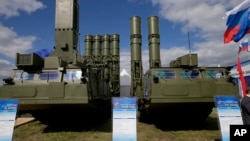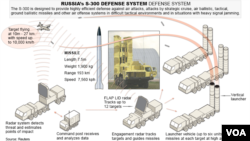Prime Minister Benjamin Netanyahu expressed Israel's "grave concerns" over Russia's decision to sell sophisticated S-300 air defense systems to Iran in a phone conversation Tuesday with President Vladimir Putin, who responded that the missiles are "strictly defensive" weapons.
Putin lifted a five-year ban on providing S-300s to Iran on Monday.
A statement from Netanyahu's office said he told Putin that the move would "only encourage Iranian aggression in the region and further undermine the stability of the Middle East."
Russia's S-300 Air-Defense System
Russia's S-300 air defense system (ADS) is considered a powerful and dangerous weapon because of its:
Mobility - All units are able to traverse difficult terrain; mobility makes it less likely to be a target
Wide firing range - Fires at low-altitude threats, such as cruise missiles, and high-altitude threats (warplanes) at extremely high velocity
Low maintenance / high degree of reliability - Missiles are sealed when manufactured and require no maintenance
Ease of use - Sets up quickly, is easy to operate and ready to fire within five minutes
Source: Institute for the Study of War
The Kremlin's website reported that Putin responded to Netanyahu's concerns by saying the missiles do not threaten the security of Israel or other Middle Eastern countries. The website said the phone conversation was initiated by the Israeli prime minister.
Ali Shamkhani, the head of Iran's Supreme National Security Council, told Russia's Interfax news agency Tuesday that Moscow could begin delivering the S-300 air defense systems by the end of this year.
Russian Security Council Secretary Nikolai Patrushev told Interfax on Tuesday that the speed of deliveries depends on the manufacturers and is expected to take at least six months to complete.
The $800 million contract dates back to 2008, but Russia froze the contract in 2010 after the United Nations Security Council imposed sanctions on Iran.
US concerned
The United States expressed concern Monday about the Putin's decision to go ahead with the sales.
White House spokesman Josh Earnest said the administration had previously made known its objection to Russia's possible sale of S-300s to Iran, and that Secretary of State John Kerry "had the opportunity to raise these concerns once again in a recent conversation" with Russian Foreign Minister Sergei Lavrov.
Earnest said Russia understands the U.S. takes seriously the safety and security of its allies in the region.
U.S. State Department spokeswoman Marie Harf said Monday that transfer of S-300 missiles to Iran would not violate existing U.N. Security Council sanctions, but that the U.S. believes "this is not the time" for the sale given the unrest in the region. She also said the U.S. does not think such a transfer would affect the unity of the six powers that are negotiating with Iran.
Explaining the decision to lift the ban on providing S-300s to Iran, Russian Foreign Minister Sergei Lavrov said that given the progress reached between Iran and the six P5+1 world powers (China, France, Russia, the United Kingdom, and the United States, plus Germany) recently in nuclear talks, the rationale for the international embargo on supplying Tehran with S-300s, and Russia's own ban, had "completely disappeared."
Lavrov added that the S-300 is "exclusively defensive in nature, not adapted for offensive purposes and and will not jeopardize the security of any state in the region, including, of course, Israel."






